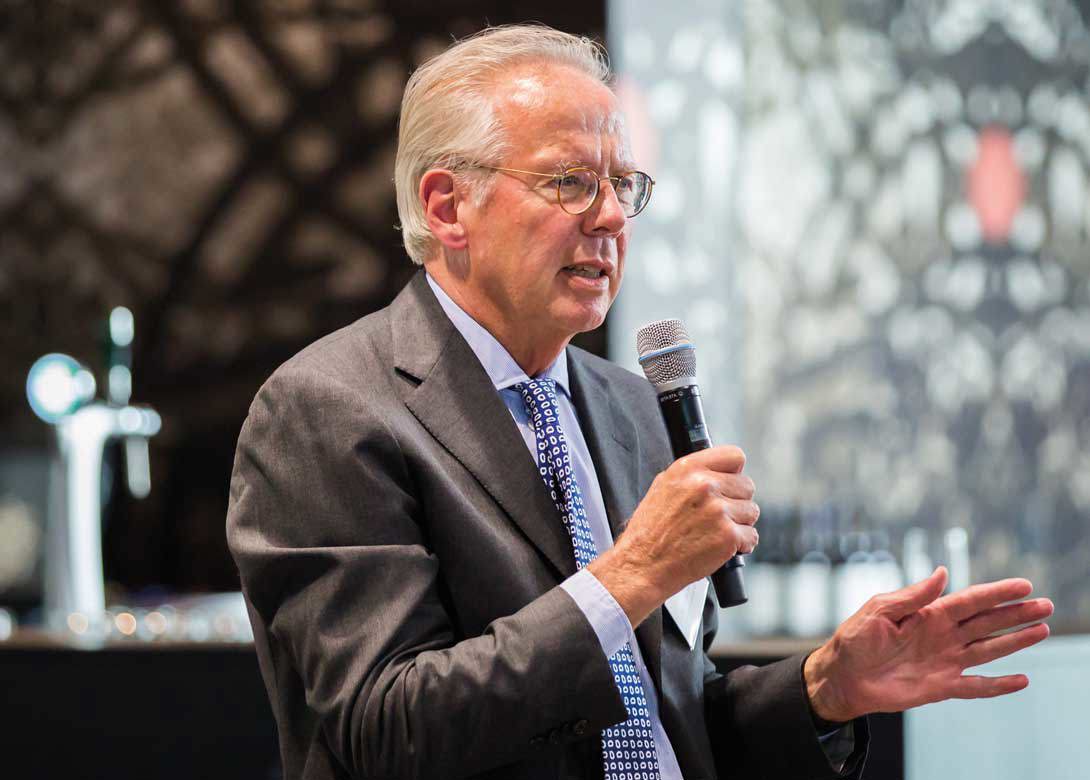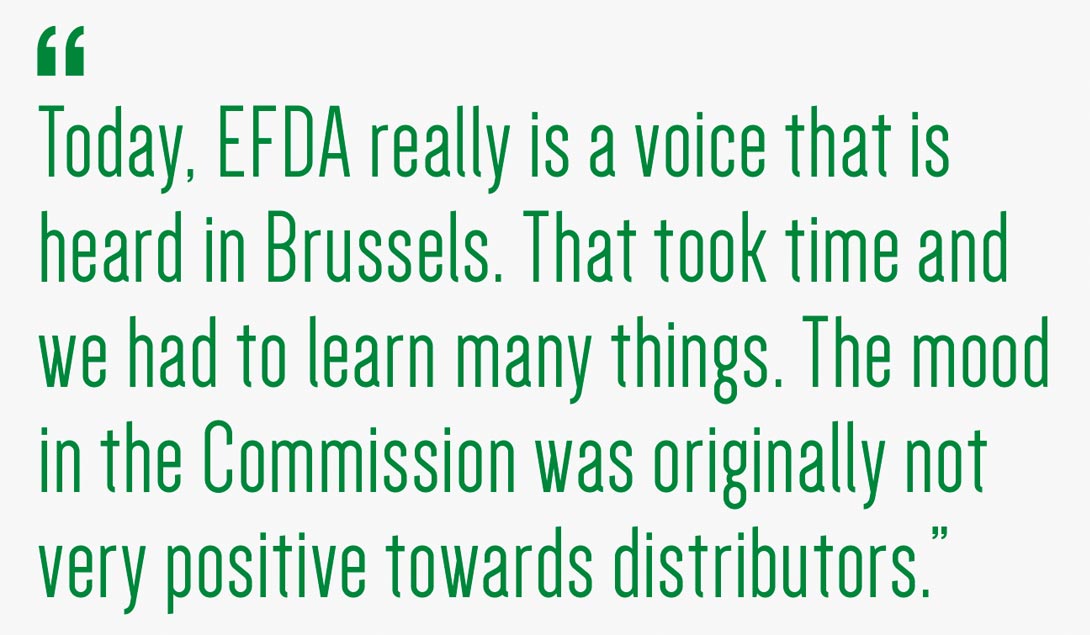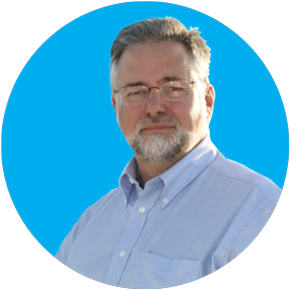
Following a successful sixth EFDA Conference in Rotterdam, Executive Editor Phil Matten visited the offices of Keller & Kalmbach in Munich to talk with one of three men largely responsible for the creation of the European Fastener Distributor Association.
Dr Seidl explains: “EFDA was designed to be an association of associations, so we really need to start with the FDS to understand how it came into being.” The Fachverband des Schrauben-Grosshandels is the German federation of fastener distributors.
“I came into our family company in 1975,” says Dr Seidl. “At that time there was no organisation for fastener distributors in Germany. There were just informal meetings locally, because the market was very much local.”
“In the late 1970s companies began to appear that had no real stock investment, paid little attention to quality, and just imported anything from the Far East. It was Mr Peters, then owner of Widex Peters in Düsseldorf, who said, ‘we must give proper stockholders a better image’. He invited seven of the major fastener distributors from around Germany to meet as the ‘Düsseldorf Kreis’.”
The ‘circle’ met several times and eventually Mr Peters proposed the establishment of a formal association. The FDS was founded in 1980, with its secretariat based in Bonn, then the capital of Germany, shared with an existing association for tool distributors. “The first big meeting of the FDS was in Munich in 1983, where Mr Müggenburg from REYHER was elected president. Quickly we gained more and more members. Now it seems strange but then we talked often about price. The manufacturers had a common price list, so each year when they sent their new – increased of course – one, the FDS calculated its own price list.”
“We met every year, and gained from the informal learning and networking, as well as discussing matters of common concern such as consistent box sizes, although we never did solve that problem. Early on, the technical committee was founded, which was very important because it worked intensively, with the manufacturers, and at the Deutsches Institut für Normung.”
Rapidly the FDS matured to an association of more than forty leading German fastener distributors, with members also from Switzerland and the Netherlands. The numbers have changed little since. “There were a few insolvencies, some mergers, and some new members, but our membership has been very stable at around forty-three companies.” Its presidency has also been very stable – it is no small measure of the esteem with which he is held in the German fastener distribution industry that Florian Seidl has served in the office for 26 years.
In the late 1990s European fastener manufacturers became more protective of their market. “They wanted to have a ‘Made in EU’ law, claiming good quality was only produced in Europe, and stating this on every box of fasteners.”
of national fastener associations, who all spoke German. The late Heinz Storch was then chairman of the BAFD in the UK. Bernd Stapf, at that time responsible for the Borstlap business in France, had recently worked to establish PRISME, and myself for the FDS”.
At an FDS meeting in Como, Italy, the three talked about the urgent need for a European federation that could represent fastener distributors from across Europe. “The idea was that it should be a lean organisation – an association of associations. It would not spend too much money but would be an interest and representation group at the European level, balancing the EIFI, which at that time was a very strong manufacturers’ association.”
“Then it went very fast,” recalls Dr Seidl. “In September 2000 the EFDA statute was written. You could say it was all a bit ‘handmade’, without any lawyers. There were eight initial signatories, myself and Bernd Stapf on behalf of the FDS, Heinz Storch and Alan Stennett on behalf of the BAFD, Bernard Maurin and Christine Delambre on behalf of PRISME, and Francesco Venturini and Massimo Guzzo on behalf of UDIB, the Italian fastener distributors’ association.” Florian Seidl was elected as the first EFDA president.
“We began planning our first conference – Heinz, Bernd and myself talking in a bierkeller. Bernd was soon to retire from Borstlap, so it was my idea he should become general secretary of EFDA. He was very glad of it because he really wanted to continue contributing to the industry.” That first conference was staged in Munich. “It was a very nice event. Most came from Germany, but there were some representatives from Italy, France and the UK – I remember you were one of them.”

It was a time of significant change for the FDS also. Berlin was now the capital of Germany and some including Florian Seidl were dissatisfied with the performance of the secretariat in Bonn. “It was really the toughest decision in my FDS presidency,” recalls Dr Seidl. “Many members had good relationships with the secretary so it was far from a unanimous decision – perhaps 60:40 in favour – to move to the BGA in Berlin.”
The ‘Bundesverband Grosshandel und Aussenhandel’ (BGA) is an umbrella organisation representing the interest of German wholesalers, exporters and service providers. Headquartered in Berlin, core to its mission is the belief that trade and international competition lead to global growth, prosperity and employment. Today it provides legal and secretarial services to both the FDS and EFDA, with Alexander Kolodzik acting as general secretary for both organisations.
“Without question it was the right decision. The BGA has provided
both associations with excellent professional secretaries – Mr Kolodzik has particularly demonstrated great commitment and interest in what we do and has proven himself a very good organiser.”
“Today, EFDA really is a voice that is heard in Brussels. That took time and we had to learn many things. The mood in the Commission was originally not very positive towards distributors. They thought of us as just box-shifters, who imported products to damage European manufacturers.”
“We were not successful in defending our members against the carbon steel fasteners anti-dumping. That was never a fair decision – which time proved, when the EU repealed it following successive negative rulings at the WTO. However, we learnt a lot from the experience. We cannot stop anti-dumping tariffs per se, but we can focus on ensuring they are sensible and workable.”
“This is at the heart of EFDA’s commitment to free and fair global trade. We actually supported sensible tariffs on stainless steel fasteners from India but the EU did not go through with that measure, to the harm of the European manufacturers. Brussels is too bureaucratic. That is not to say that the people are not serious about trying to get it right – I am sure most are. However, the mechanism is always too slow, and it often distorts the market in ways that are not anticipated, so it can be a very clumsy tool.”
“That makes it very important that EFDA continues to ensure EU institutions have a balanced view of the market and are not led to disruptive decisions through only seeing one part of the equation. Distributors are the agents of progress and wealth creation, so we have to fight for that.”
“Looking at the sixth EFDA Conference in Rotterdam, I feel proud of everything we have achieved. EFDA has become more pro-active, and has developed the skills to anticipate, rather than just react. It is well organised and strongly supported from across Europe. I am proud, not only of our businesses and our organisations, but of the branch as a whole. There is a feeling now of a family, and while there is always very healthy competition between us, that is a very good feeling.”

Having held senior management roles in leading automotive and fastener businesses, Phil joined Fastener + Fixing Magazine as editor in 2002. Convinced there is no substitute for ‘being there’, over 17 years of visits and interviews around the world means he has accumulated an extraordinary knowledge and perspective of the global fastener industry, reflected in his incisive and thought provoking reporting.
Don't have an account? Sign Up
Signing up to Fastener + Fixing Magazine enables you to manage your account details.